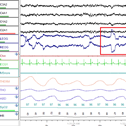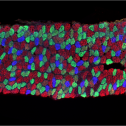Breadcrumb
- Home /
- Research /
- Programs /
- Respiratory Diseases /
- Themes

RESP | Translational Research in Respiratory Diseases Program
RESP
RESEARCH PROGRAMS
Themes
The Translational Research in Respiratory Diseases (RESP) Program addresses crucial respiratory health challenges that are relevant to both pediatric and adult patient populations. Our research spans the spectrum of basic, clinical and outcomes research. RESP researchers study topics that are germane to a wide range of respiratory diseases, including asthma, chronic obstructive pulmonary disease, cystic fibrosis, pulmonary infections, sleep apnea, pulmonary fibrosis, acute lung injury, muscular dystrophies and neurological disorders associated with respiratory diseases, and other rare respiratory disorders. We have a long history of interdisciplinary collaboration and many of our investigators have overlapping interests in more than one of our primary research areas. The four main themes of the RESP Program are:
Neuromuscular dysfunction in respiratory diseases
Infection-inflammation and lung injury
 | Chronic airways disease Theme Leader: Anne-Marie Lauzon Researchers: Carolyn Baglole, Andrea Benedetti, Jean Bourbeau, Ron Dandurand, David Eidelman, Elizabeth Fixman, Anne Gonzalez, Qutayba Hamid, John Hanrahan, Tania Janaudis-Ferreira, Jennifer Landry, Anne-Marie Lauzon, James Martin, Bruce Mazer, Christine McCusker, Ronald Olivenstein, Benjamin Smith |
|---|---|
Chronic airway diseases such as asthma, chronic obstructive pulmonary disease (COPD), cystic fibrosis, and bronchopulmonary dysplasia share common features of chronic airflow obstruction and structural changes of the airways. These disorders are associated with an underlying inflammatory process that is driven by genetic susceptibility as well as environmental factors such as allergens and cigarette smoke. The main research questions being investigated focus on elucidating the basic mechanisms that lead to the development of chronic airways disease. Studies are also attempting to identify and characterize the clinical heterogeneity of these diseases in order to better personalize prognostic, diagnostic and therapeutic tools. a) Elucidate mechanisms driving allergic inflammation and airway hyperresponsiveness in asthma that can be exploited for novel therapeutics b) Identify molecular pathways of irritant-induced (cigarette smoke, chlorine) airways disease c) Ascertain the biological basis for different asthma phenotypes, particularly severe asthma d) Test the pharmacology of new eicosanoid receptor antagonists and STAT6 inhibitory peptides that we are developing for asthma therapy e) Identify pathophysiological mechanisms, biomarkers, and the natural history of COPD phenotypes and the asthma-COPD overlap syndrome (ACOS) | |
 | Sleep disordered breathing Theme Leader: John Kimoff Researchers: Andrea Benedetti, Karen Brown, Sabah Hussain, Marta Kaminska, John Kimoff, Sushmita Pamidi, Basil Petrof, Guilherme Sant’Anna |
|---|---|
Obstructive sleep apnea (OSA) is a condition characterized by repeated episodes of upper airway obstruction during sleep, leading to intermittent hypoxia-reoxygenation, sleep fragmentation, hemodynamic fluctuations, sympathetic neural activation, oxidative stress and increased systemic inflammation. The McGill University Health Centre (MUHC) Sleep Group has an active and expanding translational research program that directly investigates the impact of OSA on common neurodegenerative disorders, insulin sensitivity and metabolic health, as well as pregnancy outcomes for both mother and child. The impact of intermittent hypoxia on respiratory and peripheral muscle structure, function, inflammation and metabolism is also being examined. a) Determine effects of OSA treatment on key clinical outcomes in two common neurodegenerative disorders, multiple sclerosis and Parkinson’s disease b) Evaluate whether OSA treatment improves insulin sensitivity and other indices of cardiometabolic health in patients c) Investigate effects of intermittent hypoxia on respiratory and peripheral muscle structure, function, inflammation and metabolism d) Determine optimal approaches to treatment of maternal OSA, focusing on both maternal and fetal pregnancy outcomes | |
 | Neuromuscular dysfunction in respiratory diseases Theme Leader: Sabah Hussain Researchers: Carolyn Baglole, Andrea Benedetti, Jean Bourbeau, Peter Goldberg, Stewart Gottfried, Sabah Hussain, Dennis Jensen, Marta Kaminska, Arnold Kristof, Anne-Marie Lauzon, Basil Petrof, Guilherme Sant’Anna, Benjamin Smith |
|---|---|
Neuromuscular dysfunction is an important source of respiratory insufficiency and chronic disability in patients with respiratory diseases. Normal breathing is critically dependent upon adequate functioning of the diaphragm and other respiratory muscles. When these muscles lose mass and strength due to inherited (e.g., muscular dystrophy) or acquired (e.g., due to critical illness, aging) neuromuscular disorders, this can lead to respiratory failure and the need for mechanical ventilation. This theme focuses on identifying the mechanisms responsible for adverse changes in skeletal muscle in respiratory diseases, how they are related to systemic and pulmonary inflammation, and whether novel therapies are capable of preventing muscle atrophy and maintaining muscle strength in respiratory patients. a) Elucidate mechanisms of muscle atrophy in the diaphragm and limb muscles of patients with chronic pulmonary diseases b) Determine how aging influences the development of muscle atrophy and weakness in respiratory patients c) Identify mechanisms, risk factors, and therapies for muscle weakness acquired in the intensive care unit, including ventilator-induced diaphragmatic dysfunction d) Develop novel therapeutic modalities capable of mitigating diaphragm muscle inflammation and weakness in primary myopathic conditions such as muscular dystrophy | |
 | Infection-inflammation and lung injury Theme Leader: Simon Rousseau Researchers: Ilan Azuelos, Faiz Ahmad-Khan, Carolyn Baglole, Andrea Benedetti, Maziar Divangahi, Elizabeth Fixman, John Hanrahan, Sabah Hussain, Arnold Kristof, Larry Lands, James Martin, Elias Matouk, Richard Menzies, Dao Nguyen, Basil Petrof, Salman Qureshi, Simon Rousseau, Kevin Schwartzman, Jason Shahin |
|---|---|
The respiratory system is exposed to many environmental insults throughout life that can result in acute or chronic injury to the lungs. Both infectious and non-infectious agents can trigger inflammation, which is essential to combat infections but also requires exquisite regulation to avoid counterproductive lung damage. In addition to major respiratory pathogens such as tuberculosis (TB), dysregulated inflammation triggered by bacteria and viruses is a major contributing factor to numerous respiratory diseases (e.g., cystic fibrosis, chronic obstructive pulmonary disease). This theme investigates the key molecular signaling pathways underlying pulmonary inflammation under these conditions, with the goal of developing new targeted therapies and biomarkers predictive of disease responses. Our researchers are also leaders in the performance of large-scale diagnostic and treatment studies involving patients infected with TB. a) Characterize molecular effectors of innate and adaptive immunity required for an appropriately integrated response to lung pathogens, including TB, influenza, and Cryptococcus neoformans b) Dissect host-pathogen interactions driving chronic infections (e.g., Pseudomonas) and acute pulmonary exacerbations in chronic lung diseases c) Investigate the molecular underpinnings of the different components of lung mucosal immunity d) Perform clinical-evaluative studies of different preventive, diagnostic, and treatment strategies for TB in Canadian (including indigenous) and international populations | |
